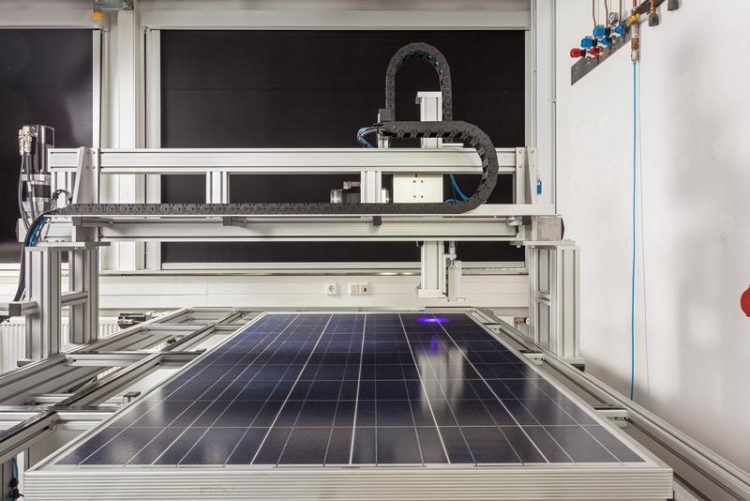The PV Module Reliability Workshop Goes to Britain!

Multi-purpose table for characterizing PV modules and testing new, non-destructive measurement techniques – developed and used by Fraunhofer ISE. ©Fraunhofer ISE
This year’s PV Module Reliability workshop is being held at Loughborough University’s Centre for Renewable Energy Systems Technology (CREST) in Leicestershire, UK, from April 16-17. This time around, the international speakers and participants will focus on new test methods and measuring tools being used and developed to enhance commonly performed PV module reliability tests.
A further key area of discussion will be the recording and analysis of climate-induced stress and environmental influence. In addition to the hosts themselves, the list of speakers will comprise renowned research and industry representatives.
2015 marks the fifth time that the Fraunhofer Institute for Solar Energy Systems ISE has organized the PV Module Reliability workshop. Having already been hosted in Chambéry and Freiburg, this year the established experts’ meeting is taking place in the UK at Loughborough University’s Centre for Renewable Energy Systems Technology (CREST). CREST has been teaching and conducting research in the field of renewable energy systems for 20 years.
On behalf of the organizers, Dr. Michael Köhl (Fraunhofer ISE) and Prof. Ralph Gottschalg (CREST) will speak about type approval, accelerated aging tests, and various degradation factors and mechanisms. “The renewal of the IEC 61215 and IEC 61646 type approval standards has paved the way for a test standard for PV modules that focuses on service life.
We intend to discuss the scientific basis for this in Loughborough,” states Fraunhofer ISE’s Dr. Michael Köhl. Additional speakers from universities and research centers will include Prof. Beate Röder from Humboldt University of Berlin, Prof. Tamizhmani Govindasamy from the Global Institute of Sustainability at Arizona State University and John Wohlgemuth from the National Renewable Energy Laboratory (NREL).
Meanwhile, company representatives will provide an insight into aspects concerning PV module reliability and quality assurance from the solar industry’s standpoint. The latest developments in potential induced degradation (PID) analysis, Raman spectroscopy, stress mapping and thermomechanics will also be presented and discussed. To view the full workshop program and to register, please visit http://www.pv-reliability.com/pv-module-reliability-workshop-2015-april-16th-to-….
About the organizers
Founded in Freiburg in 1981, the Fraunhofer Institute for Solar Energy Systems ISE is the largest solar research institute in Europe. For years, researchers at Fraunhofer ISE have been investigating areas such as the efficiency and durability of PV modules and materials, working on a number of projects including the EU projects PV PERFORMANCE or SOPHIA and the German project PV Module Reliability. The Institute’s main areas of focus include material requirements, economic feasibility and means of improving module design, as well as scientific contributions to national and international working groups and committees.
The Centre for Renewable Energy Systems Technology (CREST) at Loughborough University in Leicestershire, UK, is the largest and leading sustainable energy research center as well as one of the top academic groups in England. CREST was the first research center in the United Kingdom to develop innovative and profitable alternatives to fossil fuels, and to offer related degrees in the field of renewable energy systems. Its research activities encompass a range of technical applications, including wind power, photovoltaics, energy in buildings, grid connection and integration, and energy storage (including hydrogen storage systems).
Media Contact
All latest news from the category: Seminars Workshops
Newest articles

Innovative vortex beam technology
…unleashes ultra-secure, high-capacity data transmission. Scientists have developed a breakthrough optical technology that could dramatically enhance the capacity and security of data transmission (Fig. 1). By utilizing a new type…

Tiny dancers: Scientists synchronise bacterial motion
Researchers at TU Delft have discovered that E. coli bacteria can synchronise their movements, creating order in seemingly random biological systems. By trapping individual bacteria in micro-engineered circular cavities and…

Primary investigation on ram-rotor detonation engine
Detonation is a supersonic combustion wave, characterized by a shock wave driven by the energy release from closely coupled chemical reactions. It is a typical form of pressure gain combustion,…



